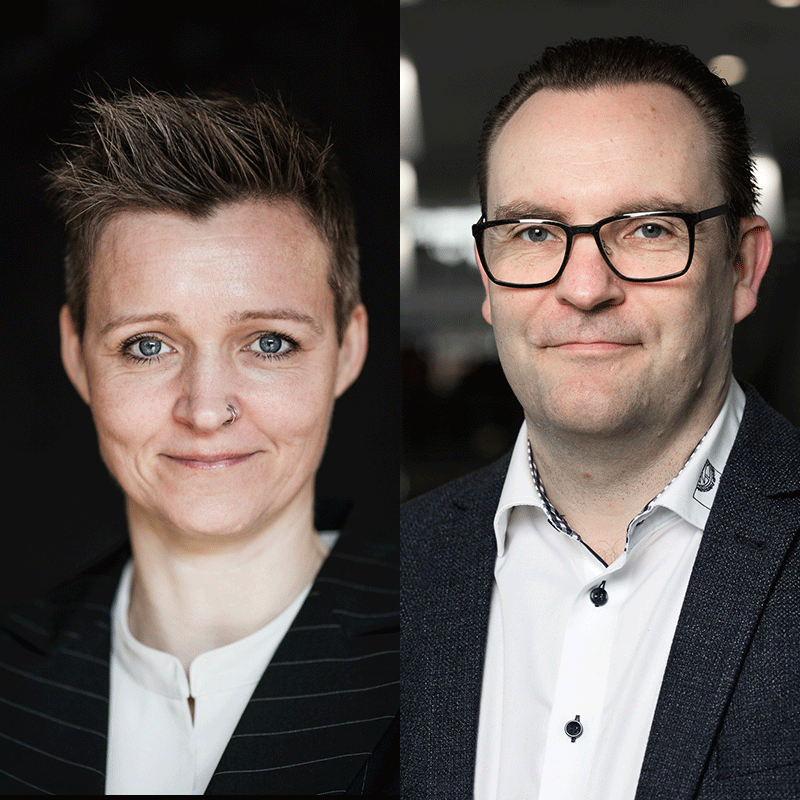"Equality is a matter of quality, not gender"
AU’s Committee for Diversity and Equality is currently busy formulating the university’s new action plan for diversity. Here Associate Professor Natalie Videbæk Munkholm and Head of Department Jacob Kjær Eskildsen talk about the work of the committee and the aim of the new action plan.

When it comes to equality and diversity, AU and the other Danish universities are lagging significantly behind the countries we normally compare ourselves with. This was the conclusion drawn at the University’s conference on gender balance, which took place in March and paved the way for an increased effort in the field such as the new Committee for Diversity and Equality. The committee members include the rector, the pro-rector and two representatives from each faculty - including Associate Professor Natalie Videbæk Munkholm and Head of the Department of Management Jacob Kjær Eskildsen.
Right now, the committee is busy formulating a new action plan, which must be ready in spring 2020 and replace the current “Action plan for more women in research 2016-2020”.
However, if you think that equality is just a matter of hiring more women, you need to think again.
Equality is not just a matter of gender, but a matter of strengthening diversity on all parameters; gender, ethnicity, nationality, etc. This is emphasised by both Jacob Kjær Eskildsen and Natalie Videbæk Munkholm. And the overall purpose? To strengthen the quality of our research.
Not everyone believes that it is a problem that one gender is strongly underrepresented in research. Nor that it is something that you should or can do something about. Part of the committee’s work is to create awareness about fact that it is a problem if we are unable to attract or retain talented researchers of both genders, says Natalie Videbæk Munkholm:
"All research shows that there is a clear correlation between diversity and research quality," she explains. "By strengthening the diversity at AU, we make the university a more attractive workplace that will attract the best employees, and this improves the quality and innovation of our research, teaching and dissemination/collaboration. The reason why the committee is initially focusing on gender is that this is currently the most burning platform. However, the principles will apply to diversity and equality in the broadest sense."
Focus on specific initiatives
The committee has selected four focus areas that will constitute the foundation of the action plan. These are recruitment, talent development, management and parental leave. In contrast to the former action plan, which mainly focused on measuring the development in the actual number of female employees, the new action plan will measure the introduction of specific initiatives that promote equality.
Much of the work carried out by the committee thus focuses on identifying specific initiatives within each focus area that according to research will have a positive effect on diversity. Within recruitment, it would be an obvious choice to look at recruitment criteria, job postings and at how you avoid a gender-skewed assessment of applicants by not just looking at the number of publications but also including teaching and dissemination/collaboration and remembering to consider parental leave, etc.
“All in all, the aim of our equality efforts is to get as much of the talent pool in play as possible - in relation to staff as well as students,” says Jacob Kjær Eskildsen. “We thus need to avoid using conscious or unconscious discriminatory actions when we recruit. We’ll never be able to come up with a one size fits all solution, as all faculties and departments face different challenges. However, with the new action plan and the various initiatives we can ensure that we’re all working in the same direction. And this is imperative if we are to make a change.”
What happens next?
The final draft for the new action plan is scheduled to be completed in January 2020. The draft will then be discussed by the senior management team and will subsequently be sent to the faculties for consultation. The final action plan is scheduled to be ready during spring 2020.
In addition, Aarhus University will be hosting the second cross-disciplinary conference on equality in 2020. The conference takes place on 13 March 2020 and is open to everyone.
Would you like to know more?
If you want to know more about the work carried out in the committee, please contact:
Natalie Videbæk Munkholm (nvm@law.au.dk) or Jacob Kjær Eskildsen (eskildsen@mgmt.au.dk)
Read more:
- Read more about AU’s Committee for Diversity and Equality
- Read “Action plan for more women in research 2016-2020”
- Visit AU’s website and get information and inspiration for how to work with gender balance in research
- Read the article Debate on gender balance